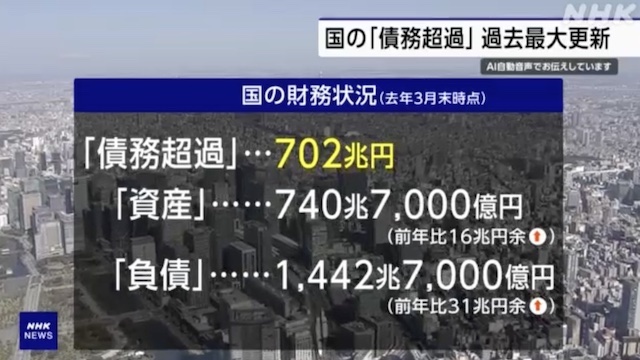TOKYO, Jan 26 (News On Japan) - Japan's Ministry of Finance has released the country's financial status as of the end of March last year, showing that the amount of "debt exceeding assets" has reached a record high of 702 trillion yen. This increase is largely due to the issuance of additional government bonds to accommodate substantial supplementary budgets.

To provide a clear picture of the nation's financial health, the Ministry of Finance compiles data on both the general and special accounts, presenting them in a format similar to that of private sector corporate financial statements. According to the financial status report published on the 26th, the nation's "assets," which include infrastructure such as roads and marketable securities, increased by more than 16 trillion yen from the previous year to 740.7 trillion yen. This rise was partly attributed to the revaluation of dollar-denominated securities in yen due to the depreciation of the currency.
On the other hand, "liabilities" grew by over 31 trillion yen from the previous year to 1,442.7 trillion yen, driven by the issuance of new government bonds to cover the shortfall in funding following the compilation of a supplementary budget of approximately 29 trillion yen for economic measures.
As a result, the amount of debt exceeding assets surged by 15 trillion yen from the previous year to a record high of 702 trillion yen. Furthermore, the "excess costs," which are analogous to a company's net loss, resulted in a deficit of 32.2 trillion yen for the last fiscal year. Although this represents an improvement of more than 8 trillion yen compared to the previous fiscal year, the deficit remains above pre-pandemic levels.
Source: NHK


 by
by 












